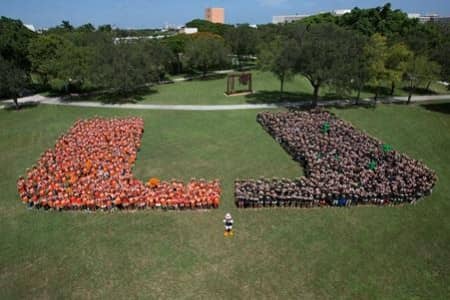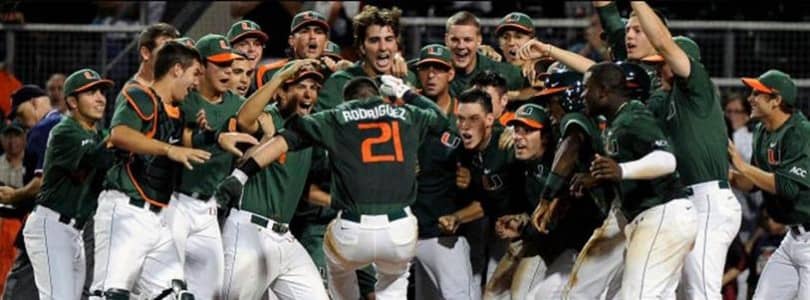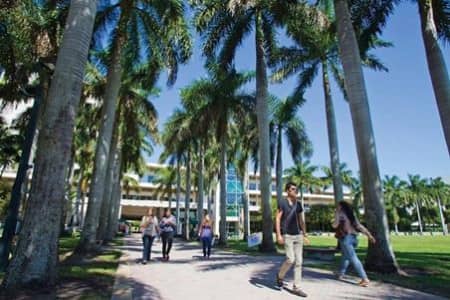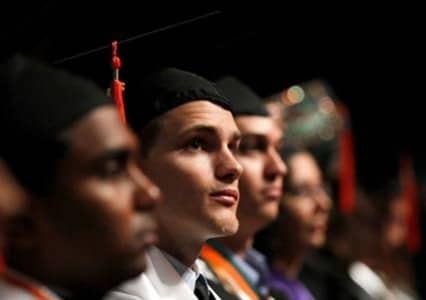University of Miami
Coral Gables, Florida
University of Miami is known for its major research initiatives. The University is involved in nearly $330 million in research a year—a vast majority of which is put to good use at the Miller School of Medicine. UM grooms its students to become strong individuals with excellent leadership skills. Students are taught to recognize their duty to both the local community as well as the global society.
Get to know University of Miami
College Highlights
FIRST YEAR SEMINAR
First year seminars are available to students enrolled in the College of Arts & Sciences. In small groups, students collaborate with one another and learn the foundations of a liberal arts education. Faculty facilitate discussion among students and encourage teamwork. There are approximately 24 students in every seminar. The following are three examples of first year seminars:
Religious Liberty from Socrates to Hobby Lobby: This seminar explores the true definition of religious liberty and challenges current issues facing freedom. The course begins with Socrates and ends with the Obamacare contraception mandate and Hobby Lobby.
Encountering the Holocaust—History, Literature, and Film: This seminar is a deep exploration of the Holocaust and the series of events that led to genocide. Together, faculty and students examine historical texts, film, monuments, literature, and more. When combined, these resources provide an eye opening view of the past.
New Art Aesthetics: This seminar examines the Arts as something to be both appreciated and preserved. It’s true that certain music, films, and artworks speak to our desires, but do we know why? This course investigates the value of new art before scholars have weighed in with their opinions.
UNDERGRADUATE RESEARCH
The College of Arts and Sciences is the #1 authority on undergraduate research at UM. Research is an amazing opportunity for students to demonstrate both their knowledge and curiosity within a specific area of study. Research can vary from collaborating with a professor to creating original work abroad. Below are a few examples of the research opportunities available at UM:
Lois Pope Neuroscience Summer Scholarship: To participate in this research effort, students must have already taken 30 credit hours and have a minimum 3.0 cumulative, science and major GPA. Lois Pope scholars average about 40 hours of research a week. Accepted students do not have to have previous experience, but they must be highly motivated.
Honors Summer Search: Honors students may elect to participate in a summer research program that explores the humanities, social sciences, and natural sciences. Participants work with a faculty member on a project that lasts between six and eight weeks. Students enrolled in the program receive 3 Honors credits upon the completion of the project.
“Beyond the Book” Scholarships for Research-Based Learning: Beyond the Book gives students the chance to explore learning opportunities beyond the classroom. Research in this program can range from fieldwork to summer lab research. Participants in this program receive a $2,500 stipend.
ENROLLMENT BY ETHNICITY
Non-U.S. Citizen: 13%
Hispanic/Latinx: 24%
Black or African American, non-Hispanic: 9%
White, non-Hispanic: 42%
Native/Indigenous American or Alaska Native, non-Hispanic: 0%
Asian, non-Hispanic: 5%
Native Hawaiian or other Pacific Islander, non-Hispanic: 0%
Two or more races, non-Hispanic: 3%
Race and/or ethnicity unknown: 4%
RESIDENTIAL FIRST YEAR EXPERIENCE
As an extension of the first year experience, students live among one another in learning communities that fosters academic and personal growth. There are four desired outcomes for the residential first year experience: academic success, community, transition, and safety/wellness.
Academic Success: Part of the FYE is learning about academic standards. The transition from high school to college can be difficult for some students, especially when they don’t know what to expect from their classes. The FYE helps smooth out some of the confusion by preparing students for their new academic standards and challenges.
Community: The residential experience explores the bonds of community. Students and faculty explore the significance of our global society, as well as the duties each individual has to maintaining our world. Students also learn about diversity and respect for all groups.
Transition: Students will eventually acclimate to the campus and social scene of college. The residential experience works to enhance those possibilities through peer bonding and support from faculty. Beyond establishing a social life, students will have the opportunity to explore themselves and grows as individuals.
Safety/Wellness: Maintaining good physical and mental health is vital to the undergraduate experience. The FYE teaches students the value of their own wellbeing to that they will learn to be proactive about their choices.
THE OFFICE OF CIVIC AND COMMUNITY ENGAGEMENT
The Office of Civic and Community Engagement facilitates and promotes relationships between students, faculty, and community partners. University of Miami regards service as an integral part of the undergraduate experience and pushes students to recognize their duty to the community. By participating in service, students have the amazing opportunity to shape the city around them and enact positive change. University of Miami takes on several different initiatives and projects and offers service learning courses and community-based research.
Initiatives: University of Miami focuses on several initiatives in and around Southern Florida. Below are a few examples:
Southridge High School Partnership: This initiative allows UM students to work with underprivileged and underrepresented high school students in Miami-Dade County. Through this program, high school students receive help from UM undergraduates in core academic subjects. The purpose of this partnership is to close the gap between underprepared high school students and college. UM students work directly with high school teachers to fine tune their curriculum and their approach to teaching. Through this collaboration, high school teachers can better prepare their students for the demands of college.
Affordable Housing Initiative: The housing crisis is a huge problem in America, with many families struggling with foreclosures, unsafe neighborhoods, and lack of resources. Florida has the second highest foreclosure rate in the country, making the housing crisis a major reality in the community surrounding UM. Through this initiative, UM students and faculty across several disciplines work with community partners to promote affordable housing. Currently, UM is working to implement service learning into the cause. The University believes that service learning will enhance efforts and integrate academic theory into finding solutions.
Urban and Environmental Sustainability: The Urban and Environmental Sustainability program maintains that issues of sustainability are complex and need to be examined from many different perspectives. Students involved in this initiative have the opportunity to work with policy experts, urban planners, faculty, grassroots activists, not-for-profits, government agencies, and scientists. Together, these groups identify key issues and work toward solutions.
THE COLLEGE OF ENGINEERING RESIDENCE
The College of Engineering has an established residence in University Village. Students living in the apartment are involved in a residential research experience in collaboration with the National Science Foundation. The focus of the project is develop habits of sustainability in conjunction with new technology.
Admission
TEST SCORES
Required
FRESHMAN PROFILE
SAT Evidence-Based Reading and Writing
25th Percentile: 620 | 75th Percentile: 700
SAT Math
25th Percentile: 630 | 75th Percentile: 720
ACT Composite
25th Percentile: 28 | 75th Percentile: 32
ACT Math
25th Percentile: 26 | 75th Percentile: 30
ACT English
25th Percentile: 29 | 75th Percentile: 34
Tuition & Cost
Tuition: $52,080
Fees: $1,602
Room: $8,900
Board: $6,570
Contact University of Miami
Contact Admissions
Admissions Website
(305) 284-6000
admission@miami.edu
Campus Location
1320 S Dixie Hwy
Coral Gables, FL 33146
(305) 284-2211




